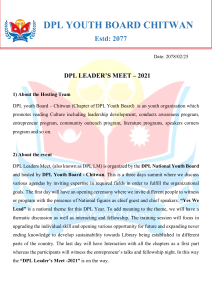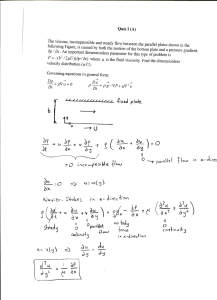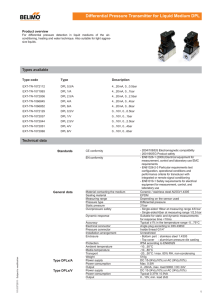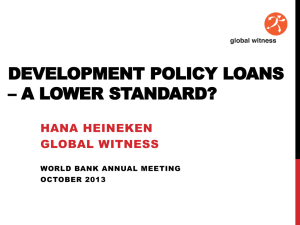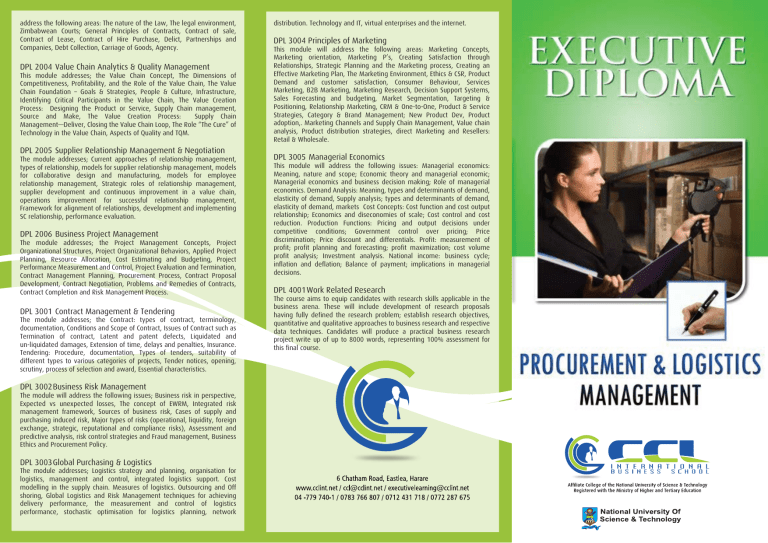
address the following areas: The nature of the Law, The legal environment, Zimbabwean Courts; General Principles of Contracts, Contract of sale, Contract of Lease, Contract of Hire Purchase, Delict, Partnerships and Companies, Debt Collection, Carriage of Goods, Agency. DPL 2004 Value Chain Analytics & Quality Management This module addresses; the Value Chain Concept, The Dimensions of Competitiveness, Profitability, and the Role of the Value Chain, The Value Chain Foundation – Goals & Strategies, People & Culture, Infrastructure, Identifying Critical Participants in the Value Chain, The Value Creation Process: Designing the Product or Service, Supply Chain management, Source and Make, The Value Creation Process: Supply Chain Management—Deliver, Closing the Value Chain Loop, The Role “The Cure” of Technology in the Value Chain, Aspects of Quality and TQM. DPL 2005 Supplier Relationship Management & Negotiation The module addresses; Current approaches of relationship management, types of relationship, models for supplier relationship management, models for collaborative design and manufacturing, models for employee relationship management, Strategic roles of relationship management, supplier development and continuous improvement in a value chain, operations improvement for successful relationship management, Framework for alignment of relationships, development and implementing SC relationship, performance evaluation. DPL 2006 Business Project Management The module addresses; the Project Management Concepts, Project Organizational Structures, Project Organizational Behaviors, Applied Project Planning, Resource Allocation, Cost Estimating and Budgeting, Project Performance Measurement and Control, Project Evaluation and Termination, Contract Management Planning, Procurement Process, Contract Proposal Development, Contract Negotiation, Problems and Remedies of Contracts, Contract Completion and Risk Management Process. DPL 3001 Contract Management & Tendering The module addresses; the Contract: types of contract, terminology, documentation, Conditions and Scope of Contract, Issues of Contract such as Termination of contract, Latent and patent defects, Liquidated and un-liquidated damages, Extension of time, delays and penalties, Insurance. Tendering: Procedure, documentation, Types of tenders, suitability of different types to various categories of projects, Tender notices, opening, scrutiny, process of selection and award, Essential characteristics. DPL 3002 Business Risk Management The module will address the following issues; Business risk in perspective, Expected vs unexpected losses, The concept of EWRM, Integrated risk management framework, Sources of business risk, Cases of supply and purchasing induced risk, Major types of risks (operational, liquidity, foreign exchange, strategic, reputational and compliance risks), Assessment and predictive analysis, risk control strategies and Fraud management, Business Ethics and Procurement Policy. DPL 3003 Global Purchasing & Logistics The module addresses; Logistics strategy and planning, organisation for logistics, management and control, integrated logistics support. Cost modelling in the supply chain. Measures of logistics. Outsourcing and Off shoring, Global Logistics and Risk Management techniques for achieving delivery performance, the measurement and control of logistics performance, stochastic optimisation for logistics planning, network distribution. Technology and IT, virtual enterprises and the internet. DPL 3004 Principles of Marketing This module will address the following areas: Marketing Concepts, Marketing orientation, Marketing P’s, Creating Satisfaction through Relationships, Strategic Planning and the Marketing process, Creating an Effective Marketing Plan, The Marketing Environment, Ethics & CSR, Product Demand and customer satisfaction, Consumer Behaviour, Services Marketing, B2B Marketing, Marketing Research, Decision Support Systems, Sales Forecasting and budgeting, Market Segmentation, Targeting & Positioning, Relationship Marketing, CRM & One-to-One, Product & Service Strategies, Category & Brand Management; New Product Dev, Product adoption,. Marketing Channels and Supply Chain Management, Value chain analysis, Product distribution strategies, direct Marketing and Resellers: Retail & Wholesale. DPL 3005 Managerial Economics This module will address the following issues: Managerial economics: Meaning, nature and scope; Economic theory and managerial economic; Managerial economics and business decision making; Role of managerial economics. Demand Analysis: Meaning, types and determinants of demand, elasticity of demand, Supply analysis; types and determinants of demand, elasticity of demand, markets Cost Concepts: Cost function and cost output relationship; Economics and diseconomies of scale; Cost control and cost reduction. Production Functions: Pricing and output decisions under competitive conditions; Government control over pricing; Price discrimination; Price discount and differentials. Profit: measurement of profit; profit planning and forecasting; profit maximization; cost volume profit analysis; Investment analysis. National income: business cycle; inflation and deflation; Balance of payment; implications in managerial decisions. DPL 4001 Work Related Research The course aims to equip candidates with research skills applicable in the business arena. These will include development of research proposals having fully defined the research problem; establish research objectives, quantitative and qualitative approaches to business research and respective data techniques. Candidates will produce a practical business research project write up of up to 8000 words, representing 100% assessment for this final course. Introduction The programme is designed for professional business practitioners who are interested in significantly advancing their career in the area of procurement and logistics management. The programme of study covers the following areas: operations management, transportation and physical distribution, procurement, manufacturing, warehousing, inventory, retailing, global business and logistics, and the role of information management in facilitating effective supply chain management. The course will meet the needs of those professionals with technical and supervisory skills in logistics and supply chain management. Objectives of the Programme • To equip candidates in both Private and Public sectors with competencies and skills to deal with the challenges of the Procurement & Logistics Environment. • To develop competencies in practitioners to manage and improve supply chain processes and performance. • To develop responsible and effective supply chain practitioners who can handle the business risks of supply chains and enhance supply chain value creation. Entry Qualifications • At least 5 O’ Levels at grade C or better inclusive of English and mathematics. However, candidates who do not have O; Level mathematics can apply and shall be required to successfully complete a compulsory mathematics access course (Quantitative Methods CQM 1100) before commencement of the programme. • A minimum of two years’ relevant work experience. • Higher qualification will be an added advantage. Duration of Programme The programme consisting of coursework shall normally be completed over 24 months on an intensive part-time basis (week-ends). Course Synopsis DPL 1001 Business Communication The aim of this module is to address the need for a Business Executive to be knowledgeable and competent in dealing with the communication challenges faced by today’s organisation. To achieve in the business world today one have to be able to communicate well. Oral communication and report writing are central to decision making in organisations. This module aims to rescue executives who often struggle with their communication skills to achieve the right impact. The module will address the following issues; Communication Theory, Communication in an Organisation, Written Communication, Messages, Oral Communication, Meetings, Graphic Communication, Audio and Visual Aids. DPL 1002 Quantitative Methods This course is a study of quantitative methods and approaches in organization. The objective of the course is to familiarize the student with advanced quantitative approaches and mathematical optimization techniques used to address managerial and industrial problems. Students will understand and apply the basics of descriptive statistics and inferential statistics to improve or enhance the decisions they make in business. This module will address; Collection and presentation of numerical information, Data Description, Business Calculations, Correlation and regression analysis, Probability, Linear Programming: Assumptions Graphical , Sampling, Index Numbers, Time Series Analysis. DPL 1003 Business Analysis & Strategy The roots of business are premised on value creation and success hinges on the ability to create superior value for stakeholders. Businesses do not operate in a vacuum and they compete for markets. The whole essence of analysis and understanding of the operating business environment (broadly micro and macro) is to place the business at a strategic advantage over its competitors to deliver superior value. This module attempts to develop skills and understanding of the variables (either internal or external) that militate against and also those that facilitate value creation. The objective being to exploit those factors that support value creation and working around those with adverse impact. The module addresses; The business environment, Strategic Planning Process, Strategic Analysis, Strategic Review, Strategic Refocusing, Business Planning, Operational and Functional Planning and the Supply Chain Management Framework. DTM 1004 Treasury Relationship Management The course seeks to develop an all rounder in the field of Treasury Relationship Management. The whole essence of understanding Treasury Relationship Management is to enhance shareholder value by boosting revenue and profit. This module attempts to develop skills and understanding of Treasury Relationship Management through enhancing the tools of crafting and implementing a uniform Treasury relationship management programme. This module will address; treasury relationships, critical stakeholders in treasury management, new generation organization, fundamentals of relationships, Internal relationship management, treasury relationship development cycle, assessing treasury relationships, customer relationship management strategies, making treasury relationships work. DPL 1004 Supply Chain Informatics & Support Systems This course is intended to help as a guide students plan, design, and implement supply chain information management systems. A thorough understanding of requirements and alternatives leads to more successful and flexible SCM systems. The course looks at the best ways to create that understanding by combining the technical and functional foundations for students to understand SCM information systems. Students will gain an understanding of these technologies as they relate to, and are used in a business setting. The module addresses; Supply data sources, Data processing, Value of Information, Information management and decision making Competitive intelligence, Supply information system, Information management infrastructure, and Modern treasury information systems, Selection and use of supply chain software. DPL 1005 Strategic Procurement Management This module addresses of ‘best practice’ purchasing, contracting and supply chain management, and philosophies of purchasing, contracting and supply chain management. Planning strategic purchasing, contracting and supply chain management. The management of internal clients; the mapping of power relationships within supply markets; assessment of post-contractual risks, implementing strategic purchasing decision, make-buy decisions, supplier selection, relationship selection, conflict management, performance measurement. DPL 1006 Business Finance & Budgeting The module addresses; the goal of the finance function. Analysis of Financial Position: Ratio and Funds Flow Analysis. Concepts of value and return, Risk and Return, Financial and Operating leverage, Design of Capital Structure, Management of Working Capital, Estimation and Financing, Management of Cash, Receivables and Inventory and Current Liabilities, Capital and Money Markets, Leasing, Hire purchase, Corporate Financial Policy and strategy, financial ratios, budget analysis and investment appraisal. DPL 2001 ERP & Inventory Management The module addresses; material requirements Planning (MRP) and Enterprise Resource Planning (ERP) systems. We also review pull systems and how these can be combined with MRP/ERP, Demand planning, planning and transaction-based systems, Stock issue, management processes and Stock valuation, Cost management, EOQ, Reorder levels and EDI systems. DPL 2002 Supply Chain & Operations Management The main objective of the subject is to demonstrate the inter linkage between operations management and supply chain management. The course seeks to provide the key concepts and solutions in the design, operation, control and management of supply chains as integrated systems. The module seeks to develop proficient practitioners able to accrue operational efficiencies in their supply chain processes. The participant is expected to apply and embed the concept of TQM in their supply chain management process. The module addresses; Strategic SCM, Designing and Managing the Supply Chain: Concepts, Strategies, SC Design and Implementation, SC Integration, the management of capacity, operations management and operations planning and control. DPL 2003 Business Law The module aims to get the student to develop competencies to read contracts and make informed decisions about them. The student is expected to display some understanding of the operation of the judicial system of Zimbabwe and how it affects businesses operating in the country. The student is introduced to the general principles of law and providing an understanding of how the law is sourced and administered. This module will
